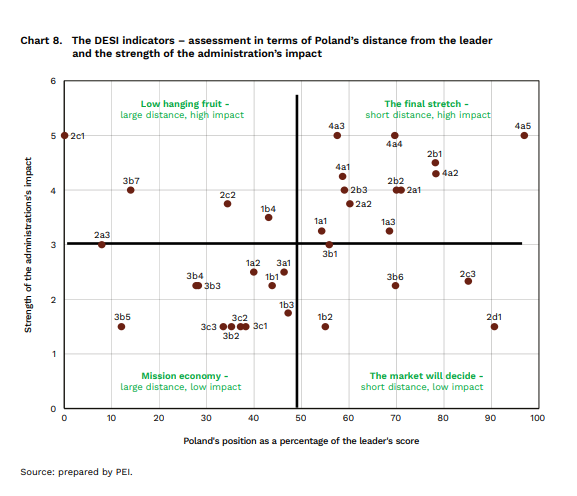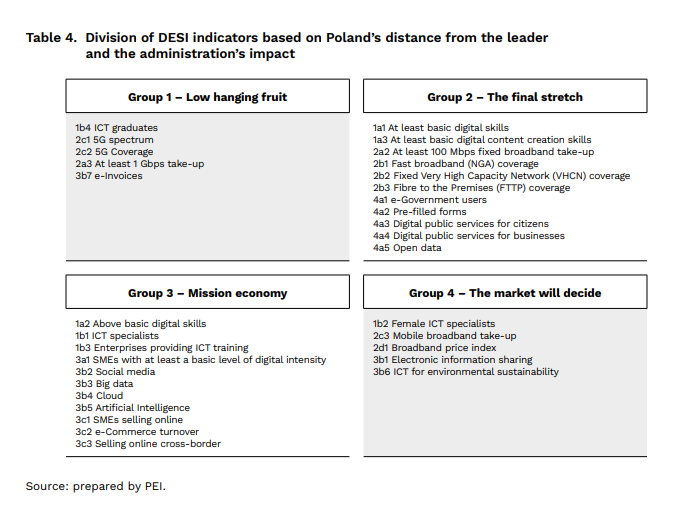Poland among the EU leaders in digital development progress
Published: 02/06/2023
The Digital Economy and Society Index (DESI) is the main tool used by the European Commission to measure the level of digitalization in EU countries. Although Poland achieved a score of 40.5 out of 100 in the index, placing it 24th among EU countries, the development level of several indicators is approaching that of the classification leaders, including Finland, Denmark, and Estonia. Despite the DESI methodology making it very difficult for member states to make any progress in the ranking, Poland is among the countries that are catching up fastest with the leaders. Currently, the index is undergoing a major transformation as part of the implementation of the Digital Decade, a new EU digitalization strategy. Therefore, changes are necessary in DESI to ensure a more objective assessment of the level of digitalization in individual EU countries, as outlined in the report by the Polish Economic Institute, "How to Measure the Digital Decade - Recommendations for an Evolution of the DESI Index."
Different levels of development in individual digital areas
Over the past six years, only five member states have managed to significantly improve their position in DESI. However, it is worth emphasizing that the overall level of digitization is increasing, and the gap between countries with lower levels of development and digital leaders is narrowing. Italy, Greece, Cyprus, and Poland are among the countries that have been reducing the gap to the top performers at the fastest pace in recent years.
A detailed analysis of individual areas in DESI has shown that in 12 indicators, Poland’s level of development is comparable to that of digital leaders. These include indicators related to advanced technical infrastructure (parameters related to access to broadband internet and fiber-optic networks), the level of development of public digital services (e-services for businesses and citizens, open data), as well as digital skills of Poles. Another group of indicators is referred to as the “mission economy,” indicating a significant gap that is challenging to close without collaboration between the administration, business, and society to achieve a common development goal. These indicators include the use of AI in companies, the number of ICT specialists, and the level of advanced digital skills.
“In order to provide criteria that Member States should consider when taking actions in line with the areas measured in DESI, we propose two criteria. On one hand, it is important to look at the distance to the leaders. If there is a significant gap in a particular indicator, it is worth examining and drawing inspiration from best practices implemented by countries with the highest scores. On the other hand, the potential impact on a given indicator should be taken into account. While decisions regarding the allocation of spectrum for 5G networks lie within the administration’s jurisdiction, influencing companies to implement AI or utilize Big Data requires more complex and long-term actions. Each country should determine for itself which areas to draw from the experiences of others and how to build social support for achieving digital goals. However, the two criteria outlined in the report can help streamline this process of reflection. This approach can identify so-called “low-hanging fruits” – indicators that can be relatively easily changed and thus improve a country’s position in DESI” – said Ignacy Święcicki, the head of the Digital Economy team at the Polish Economic Institute (PIE), points out this perspective.
DESI needs improvements
DESI provides a comprehensive description of the level of digitalization in EU Member States, but its drawback is its dependence on external factors such as the level of development of a particular country and socio-geographic conditions. There are occasional discrepancies between these factors and the rapidly changing reality.
“In the report, we highlight the importance of coordination at the national level. Fragmented actions related to digital topics, aimed at improving specific areas, do not contribute to maintaining the appropriate level of ambition and efficient use of limited resources. Within the country, there should be a clearly designated unit or entity responsible for coordinating the work of various ministries. The implementation of new digital goals – the Digital Decade, for which the European Commission requires the determination of pathways to achieve predefined objectives – is an opportune moment to reorganize cooperation among all institutions involved in the digitalization of Poland” emphasizes Ignacy Święcicki, Head of the Digital Economy Team at PIE.
***
The Polish Economic Institute is a public economic think-tank dating back to 1928. Its research primarily spans macroeconomics, energy and climate, the world economy, economic foresight, the digital economy and behavioural economics. The Institute provides reports, analyses and recommendations for key areas of the economy and social life in Poland, taking into account the international situation.
Media contact:
Ewa Balicka-Sawiak
Press Spokesperson
T: +48 727 427 918
E: ewa.balicka@pie.net.pl
Kategoria: Analysis / Digital Economy / Press releases / Report / Reports 2022







